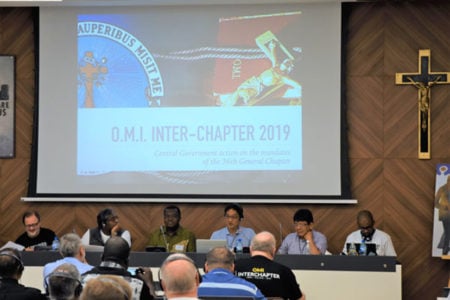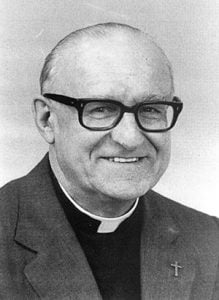(An Oblate Reflection for the Extraordinary Mission Month October 2019)



Saint Eugene de Mazenod, in the first Rules, said: “In imitation of these great models (Jesus Christ and Apostles), one portion of their life will be given over to prayer, interior recollection and contemplation in the privacy of God’s house, wherein they will dwell together in common. The other portion will be entirely consecrated to outside works requiring the most active zeal…”

Fr. Fernand Jetté, O.M.I. Superior General: 1974.11.26 – 1986.09.13)
Father Fernand Jetté went even further in saying that when Eugene de Mazenod spoke about the “apostolic man” he meant more about the Oblate’s manner of life rather than his missionary activities.
In our mission we would like to imitate Jesus Christ our Master. When we look at Him we see Him as a very active man: staying with the people, preaching, healing, helping, etc. But a few moments later we also see Him praying and staying in intimate relation with the Father.
Pope Francis wrote in Evangelii Gaudium: “What is needed is the ability to cultivate an interior space which can give a Christian meaning to commitment and activity. Without prolonged moments of adoration, of prayerful encounter with the Word, of sincere conversation with the Lord, our work easily becomes meaningless; we lose energy as a result of weariness and difficulties, and our fervor dies out. The Church urgently needs the deep breath of prayer…” (no. 262).
For the missionary, time spent with Jesus Christ in prayer and contemplation is never a lost time. From here he draws power, inspiration, new zeal; in prayer he also asks for the fruitfulness of his missionary works. Again, Pope Francis in Evangelii Gaudium indicates to us that a “true missionary, who never ceases to be a disciple, knows that Jesus walks with him, speaks to him, breathes with him, works with him. He senses Jesus alive with him in the midst of the missionary enterprise. Unless we see him present at the heart of our missionary commitment, our enthusiasm soon wanes and we are no longer sure of what it is that we are handing on; we lack vigor and passion. A person who is not convinced, enthusiastic, certain, and in love, will convince nobody” (no. 266).
Our Constitution no. 2 tells us: “We are men set apart for the Gospel, men ready to leave everything to be disciples of Jesus. The desire to cooperate with him draws us to know him more deeply, to identify with him, to let him live in us. We strive to reproduce in ourselves the pattern of his life.”
This cannot happen without time dedicated for prayer, meditation, studies, etc. We are missionaries, but religious missionaries, and this means that we are men of God and of the people, called to do mission, but also to build this mission on the rock which is Jesus Christ.
Through the time dedicated for being with Jesus we show that we understand whose mission it is and who is the Savior who gives efficacy to our activities to fulfill the mission.
It is not by chance that Saint Therese of Lisieux became the patroness of mission although she never left her monastery. The fruits of our mission come from two sources: our different activities that witness to our love for Jesus amidst people, and our following Jesus with hands put together in prayer.
In our missionary endeavours, it is thus necessary to find a balance between contemplation and action. On one hand, prayer cannot become an escape from missionary and pastoral work. At the same time, the number of missionary activities cannot steal away the time which should be dedicated to our encounter with Jesus. Finding the balance between these two components of our life will allow us to really look at the world and its needs through the eyes of the crucified Savior (cf. C. 5).


